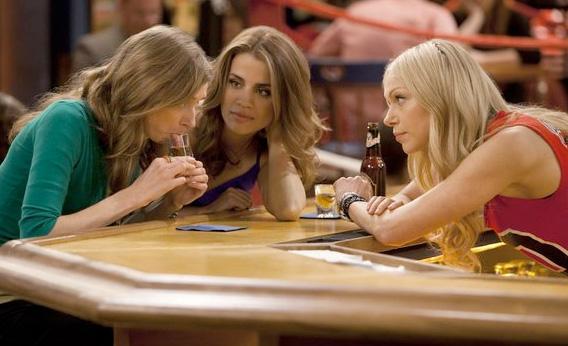Are You There, Chelsea? (NBC, Wednesdays at 8:30 p.m. ET) remixes a collection of humorous essays by the multitalented irritant Chelsea Handler into a sitcom starring Laura Prepon as Handler’s almost-all-id alter ego. The book is called Are You There, Vodka? It’s Me, Chelsea—a name which, though too polysyllabic and dipsomaniacal to work for network primetime, undeniably makes irreverent sense in its corrupted echo of Judy Blume. The title’s elision for television is perhaps ill-considered; however, given Handler’s persona as a dedicated lush, you can parse it as a question posed by a friend or first responder desperate to snap her back from a boozy brownout.
The first two installments of the show lift themes, incidents, and narrative strategies from the book. These include Chelsea’s spasm of amused disgust upon confronting the ruddy pubic shrubbery of a ginger-haired lover; her supra-Rogetian command of madcap synonyms for the female genitalia; and a condescending affection for little people, whom she likes to call “midgets” and really likes to call “nuggets.” There is also, fundamentally, the matter of a self-concept that grounds such a worldview: “I consider myself to be a very obnoxious person.”
The heroine is not a brat or a “bitch” but something like a female bro. She cares not a whit about her mind or heart, and it would be a stretch to say that she contemplates her navel. Instead, she concentrates on her clitoris and hopes that her liver won’t give out. The writers focus strictly on her spleen, which sometimes puts them at odds with Prepon: Her brightness and buoyancy—her natural amiability—threaten to undermine the character’s integrity.
It is difficult to situate the fictional Handler in terms of class. Blue-collar isn’t quite the word. Rather, her social station is typified by the deep V-neck collar of the t-shirt that clings fondly to her as she waits tables at a New Jersey sports bar. This is not a service-industry gig held in the spirit of a middle-class slacker or a working-class striver, but of a career party chick. We might compare Chelsea’s life as a real alewife of New Jersey with that of her friend and roommate Olivia (Ali Wong) who has gone to college to become a journalist, God help her, and who has designs on an internship in Manhattan. Chelsea, in contrast, is going nowhere, professionally or emotionally. To underscore the latter point, the series offers her a second foil, an innocent soul named Dee Dee, played by Lauren Lapkus, who, with her round eyes and wiggling limbs, reads as a hybrid of Zoe Kazan and Shelley Duvall’s Olive Oyl.
The opening moments of the pilot allow Chelsea to explain how she came to be arrested for driving while intoxicated. One night, while unwinding with colleagues, she “power-slurped a worm out of a high-end bottle of tequila”—a statement that may lead you to believe that the girl is all talk. (If there’s a worm in your high-end tequila, then your tequila is mediocre mezcal.) Then, she got in her car. Perhaps you will find the show’s casual treatment of this crime to be a turnoff. (If Chelsea were more exuberant in her drunkenness and more passionate about her misanthropy, she might achieve a sturdy W.C. Fields effect, and we could be amused without complication.)
After sharing a kiss with a butch cellmate—tee-hee!—the fictional Chelsea Handler is bailed out by her crabby older sister, Sloane, who is played, crabbily, by the real Chelsea Handler. Theirs is a difficult relationship, and it’s easy to imagine Sloane barking the question of the show’s title through the fictional Chelsea’s front door: “Are you there, Chelsea? I know you’re in there, you little slut. Open up!” But it would require a fundamental misunderstanding of the show to give the title any credit as an existential query.
Who is Chelsea? What are her values? The show only bothers to care in the last act of each episode, when, after 20 minutes of antic cynicism and splattered wackiness, the time comes for hugging, learning, and plot-resolving. Are You There, Chelsea? is viable, just barely, as entertainment because it keeps things simple. If it had the slightest aspiration even to have an aspiration beyond stringing wisecracks on a loop of pure attitude, it would disappear. The show gets by as the vodka of television comedy. It aims to have no taste.
